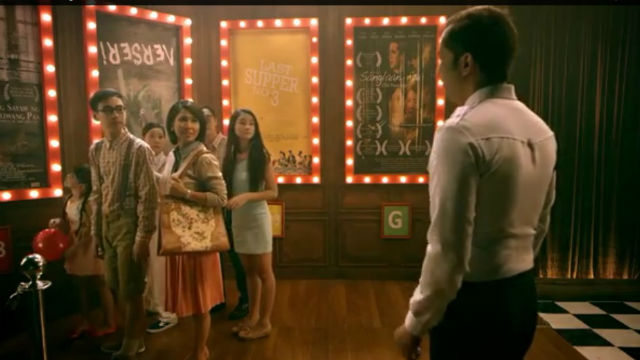SUMMARY
This is AI generated summarization, which may have errors. For context, always refer to the full article.
 Movies have a unique way of making you feel a childlike wonder. Everything in film is larger than life, from the special effects of explosions to the equally wondrous special effect of wooden thespians suddenly being able to cry on demand. The new Movie and Television Review and Classification Board (MTRCB) infomercial though dispenses with wonder and just treats the viewer like a child. It made me feel dirty to even think of watching a PG-13 film, let alone an R-18 flick.
Movies have a unique way of making you feel a childlike wonder. Everything in film is larger than life, from the special effects of explosions to the equally wondrous special effect of wooden thespians suddenly being able to cry on demand. The new Movie and Television Review and Classification Board (MTRCB) infomercial though dispenses with wonder and just treats the viewer like a child. It made me feel dirty to even think of watching a PG-13 film, let alone an R-18 flick.
The infomercial is a pastiche of censor beloved tropes designed to evoke a longing for a halcyon era of innocence and family. Numerous signs build a web whose overarching message is that any responsible, law abiding, intelligent and moral adult would not watch any film other than those rated GP. Those who do should feel ashamed. Shame is key here as it transforms a neutral act (watching a movie) into an immoral one (watching a movie leads to the degradation of the family).
The infomercial
We begin with a carefully crafted setting of carnivalesque music composed of upbeat horns and piano. It evokes clowns and days with family (ie. childhood). A little girl holds a red balloon as a family walks arm in arm to the theater entrance. Bare bulbs light up movie posters, again reminiscent of the billboards of old carnivals which had posters of strong man acts and other oddities lit up in the same way. (This is a neat trick, a seeming glorification of movies actually portrays them as spectacles of freaks.)
Our actors typify the family we all love to imagine:
- Neat: the son is dressed in suspenders, all the girls wear dresses.
- Polite: This politeness takes on the form of deference to authority. Each child proposes to see a different movie but turns to their parents to validate their choice.
- In turn the parents turn to the embodiments of the censorship system, the guard and the ticket lady, to approve their viewing fare.
- Together: The family is predominantly shot as one unit, in a line, each member inextricably linked to each other. Even in shots where one member is apart, when choosing a movie which is inappropriate for their age, the rest of the family can be seen in the background standing together; almost as if they stand in judgment of the inappropriate choice.
Steering the family to the only right and proper movie to watch (that rated GP) are the infomercial’s authority figures. First there is the male guard, immaculately dressed in a white uniform. The guard, without prompting as he is ever diligent, sets the tone with a prohibition, “Excuse me, hindi kayo pwede manood niyan,” (Excuse me. You cannot watch that.) as he informs the son that he is too young to watch the movie the boy has chosen. (The guy playing this guard can win a FAMAS just for smugness.)
After the son, the older daughter tries her hand at picking a movie. She in turn is rebuffed by the equally diligent ticket lady who informs father and daughter that the chosen film is R-16. The daughter pleads that she is above 16, to which the lady just replies with an unbelieving raise of her eyebrows.
The father would like to watch an R-18 movie “sana” but does not press his choice. The mother would seem to have the final say as everyone looks to her to decide. She herself though, interestingly, has no choice of her own. Movies, the ostensible reason why everyone is there, are rendered unimportant. What is important is family, as the mother succinctly edicts, “Pamilya tayo and sabay sabay tayo manonood.” (We are a family. We watch movies together.)
Who cares what movie, as long as we’re together. One wonders then why they couldn’t have just been together at home.

This Gordian knot is deftly untangled by the youngest daughter, the peacemaker, who admonishes, “Quiet. Kung hindi kayo magkasundo sa gusto ninyo, ako nalang ang mamimili.” (Quiet. If you cannot decide what you want to watch, let me pick the movie.)
She stands in front of the whole family as she lectures them on what movie they all will see. Thus, a little child will lead them.
Two adults, teenagers and a househelp are held to the lowest common denominator of choice, the movie appropriate for the child who carries a balloon to a movie house. And they celebrate this forbearance of what they wanted, of not watching movies they are technically allowed to see, by embracing the youngest daughter.
The message
As a piece of cinema, the MTRCB infomercial delivers a subtle message. The government not only censors what we can see but we ourselves should voluntarily self censor. Amongst all the family members only the son is under age for the movie he has chosen. Yet all of them happily agree to watch the GP movie.
Here is the ultimate internalization of the panopticon as suggested by Foucault. Authority figures are no longer needed as we police ourselves. Adult movies with adult themes are rendered inappropriate for adult minds.
There is no outright prohibition imposed on the adults or teenagers from viewing the movies they are allowed to see. The characters freely choose to literally embrace the deciding voice and opinion of a child. Moreover, their abdication of adult thought is celebrated as proper and good. The voluntary conformity of the other members of the family is what is most troubling about this infomercial which strives very hard to be cute and innocuous.
In a country where many people can’t afford to buy lunch, let alone purchase a few hours diversion in a modern cave sitting in front of a very large screen; who cares what they show before movies? We should care because eliminating the poverty of the body begins with eliminating the poverty of the mind.
No one benefits from censorship, no matter how subtly it is branded. Sex, violence, profanity, irreverence, wit; what good can viewing these bring? Anyone who asks that question has never watched A Clockwork Orange or read or seen a Shakespeare play. The world is messy, gloriously topsy turvy. To reflect on it, to think long and deep about things both trivial and profound, we must acknowledge this messiness, perhaps even revel in it.
No one benefits from being told what to think. Being nudged to inhibit curiosity or appreciation of art (whether it be film or literature, painting or dance) is a proposition for intellectual retardation. As the philosopher Peter Singer puts it, “From time to time, outstanding thinkers will emerge who are troubled by the boundaries that custom places on their reasoning, for it is in the nature of reasoning that it dislikes notices saying ‘off limits.’ Reasoning is inherently expansionist.” We don’t need to be exceptional thinkers to be curious, to want to know, to want to think for ourselves.
On censorship
It’s easy to say that censorship is for our societal good. For example, I’m sure when the MTRCB initially banned the showing of Schindler’s List in the country years ago it was more beneficial to the nation that we not be exposed to a few naked bodies (as if we didn’t see real naked children playing by the highways in our cities) rather than we learn more about the conditions during the Holocaust.
More recently, there was an uproar among Filipino Catholics when the Da Vinci Code movie was shown. Some priests urged their congregations not to watch it. Others said to go ahead and see it as a test of faith.
We have become so intellectually timid that watching an entertaining fiction can create an uproar; can be described as a crucible of belief. St. Peter had himself crucified upside down because he did not think himself worthy of being killed in the same position as Christ. Compared to that watching a movie can be considered a test of faith?
Many people, organizations and governments will tell you what to watch, what to listen, what to read, what to think. The MTRCB infomercial just does it in a sugary sweet manner with smiles and proddings, with arms around the shoulder and the assurance of Big Brother that everything is all right.
This may be appropriate for children but the infomercial would have even adults reduced to an infantile state. There comes a time when we must put away childish things and think on our own.
The infomercial does get one thing right though; the actress playing the older daughter is cute. And I mean that in a PG-13 way, not in an R-18 sense. Not that thinking of someone in an R-18 fashion is wrong. That’s the benefit of being a rational adult. There are no illicit or illegal thoughts. Where even freedom of speech is limited, the freedom of the mind is boundless.
No one, least of all yourself, should constrict your intellectual exploration. Just because movies can make you feel like a child this does not mean that they should make you think like a child as well. – Rappler.com
(Disclosure: Current MTRCB Chair Atty Eugenio Villareal was the author’s thesis advisor in law school. This was 5 years ago, long before Atty Villareal was appointed to his current position. The author has not had any contact with Atty Villareal since his law school years; nor was the author’s thesis about movies or censorship.)
Antonio Conejos is a lawyer and former professor of English at the Ateneo Loyola Schools. He protests too much about the little things and much too little about the big things. As a lad he never went to the movie house to watch age inappropriate movies as he had the internet for that. He writes about books and such at www.litreact.com
iSpeak is a parking space for ideas worth sharing. Send in your contributions to move.ph@rappler.com.
Add a comment
How does this make you feel?
There are no comments yet. Add your comment to start the conversation.